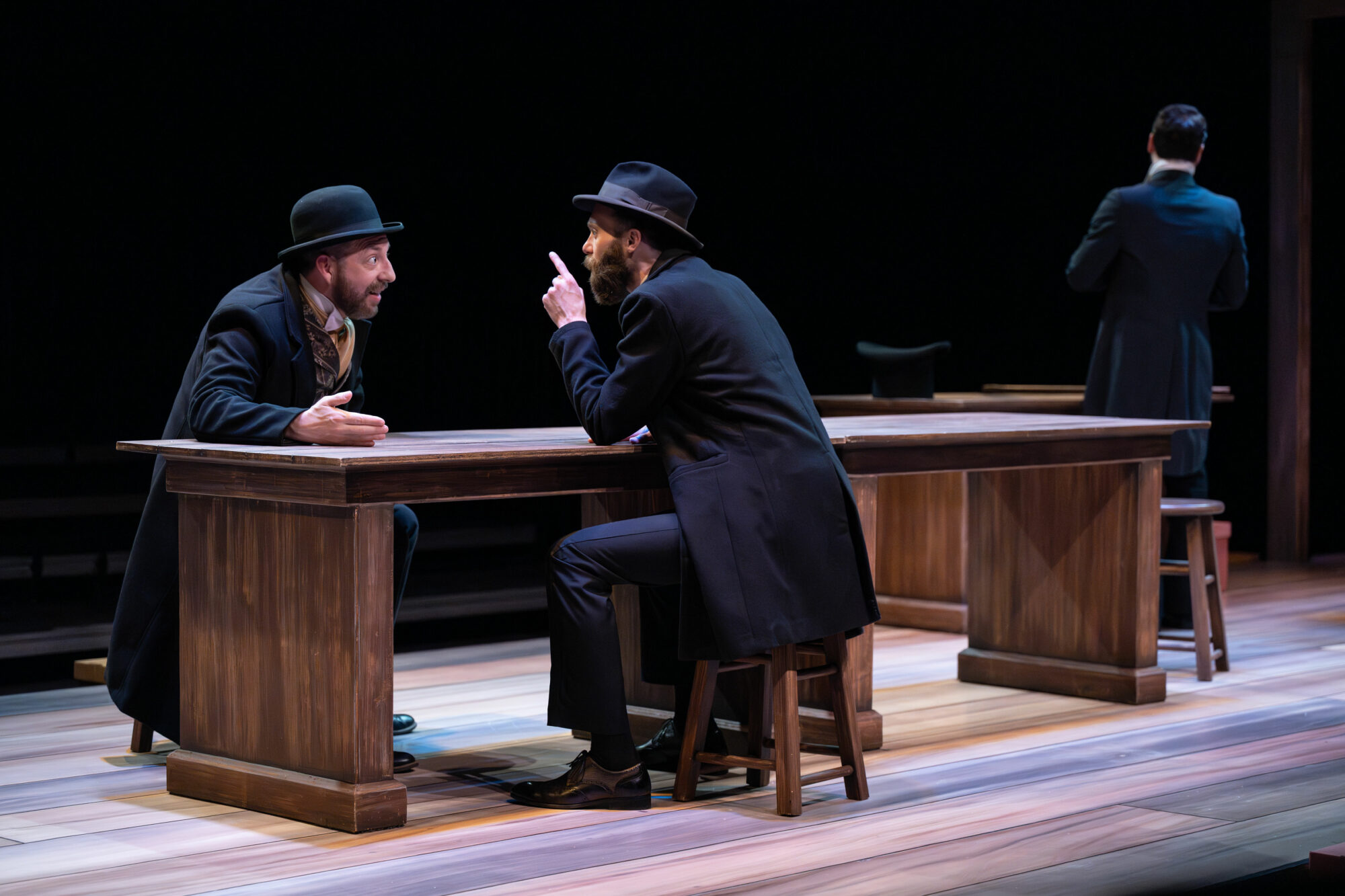This The Paladin review by Savannah Jones was originally published on February 9th, 2024. Photo: Shawn Salley
The closest I have ever come to time travel was this Sunday, when I watched Warehouse Theatre’s production of “The Lehman Trilogy.”
Written by Stefano Massini, this fascinating three-act play follows the story of the Lehman Brothers through three generations, beginning from their arrival in the United States in 1844 to the company’s ultimate collapse in 2008.
Warehouse Theatre, which is located in downtown Greenville, has often stunned audiences with their performances, and this show was no exception. Walking into the theatre, I was pulled into the story by the set, which contained overturned stools and various takeout containers. Someone dressed as a custodian entered, shuffling across the stage with a large trash bag and cleaning up the mess. When she was done, the pre-show announcements began and from there, the audience was quickly thrusted into the story.
The cast was made up of three actors, all Warehouse Theatre regulars: Thomas Azar as Henry Lehman, Christopher Joel Onken as Emanuel Lehman, and Matt Reece as Mayer Lehman. In addition to portraying the three Lehman brothers, the actors also portrayed dozens of other characters: sons, wives, business partners and more.
How were the actors able to portray so many characters? “I work from the outside in,” Azar said during the show’s talkback, which allowed audience members to discuss the play with the actors. “I try to let my body explore, sometimes without even knowing it happens. Then I clock in and see what I’m doing.”
This was evident throughout the show — with just one gesture, such as pantomiming a cigarette or solemnly folding his hands, Azar was able to fully step out of one character and into the next. This made it easy to forget that both characters were being portrayed by one actor.
The show was upbeat, with the actors switching between narrating their, or the other characters’, actions and inner thoughts, to interacting with one another. The show also required teamwork as they rearranged the set, pushing tables and throwing boxes to one another as they moved forward in the story. I was impressed by the actors’ stamina — they often had to talk and move quickly and, aside from intermission, were on the stage the entire time.
“This is the hardest show I’ve ever done,” Azar said. “There were times where I really, really was afraid of it.”
Despite the show’s difficulties and the company’s anxieties, Azar, Onken, and Reece never missed a beat, which, combined with Massini’s writing, made for an enthralling show.
With a play that is an undertaking as massive as this one, trust is important. “We’re very fortunate that the three of us have worked together, and we have a really great working relationship and a trust that has been earned,” Azar said.
He added that the three of them had also worked with director Jay Briggs in the past and knew he created a space in which it is “safe to explore.” Reece said that the process was very collaborative, and Briggs was always willing to work with them when they voiced concerns. “For us all to discuss (concerns) and figure it out together, that’s a great thing.”
One of the most significant themes throughout the show was the Lehmans’ German, Jewish upbringing. This upbringing played a major role in the brothers’ work ethic, traditions, and how they were treated in the south. To ensure they were properly honoring the culture and faith, the artistic staff and Briggs met with a rabbi, had a consultant present, and utilized dramaturg Emily Enlow’s (‘22) research.
Throughout the play, the Lehmans sat shiva multiple times and spoke to the importance of this tradition. Onken said that the prominence of shiva resonated with Briggs, who introduced the idea of the play as a whole being shiva.
“(Shiva) is a time for people to come and meet the family of those who are mourning and hear stories about them,” Onken said. “So (it was) the idea of these brothers wherever they are in time telling stories about their family, themselves, and the generations that would follow those of these patriarch archetypes sitting in Shiva waiting for you to hear the story.”
Over time, we saw how that tradition faded in the Lehman family as each generation assimilated more into American culture and prioritized their now-empire of a business over the tradition.
Speaking to what he hoped audiences would take away from the show, Onken said, “It’s a play of fathers and sons, of siblings, of family, and of your responsibility to legacy. I also think it is about how absolute power corrupts absolutely.”
Although the play spanned three hours, including the two intermissions, I was engrossed in the story the entire time and was often left breathless by the actors’ ability to both build tension and leave the audience suspended in the softer moments. The story was captivating, leading me to leave Warehouse Theatre with an even stronger appreciation for the art form’s existence.
As Onken said, “The Lehman Trilogy” is “a piece you only experience like this on the stage.” This was one of the best plays I have ever seen, and I hope that others will be encouraged to watch it too.
“The Lehman Trilogy” runs through Feb. 18. Audiences should be advised that the show utilizes loud sound effects, including gunshots and cannon fire. Tickets can be purchased online.




